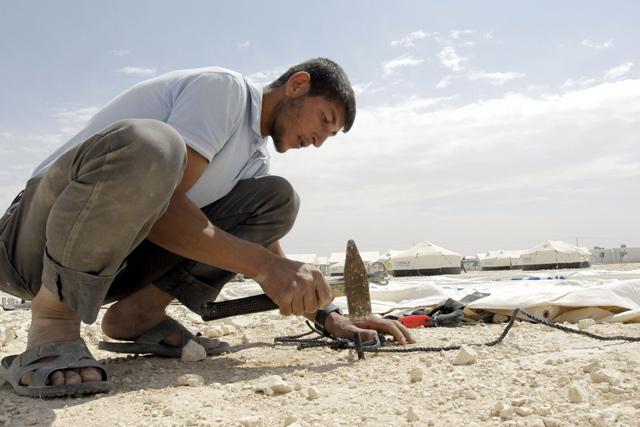You are here
Jordan calls for revision of EU relaxed rules of origin agreement
By Mohammad Ghazal - Mar 13,2018 - Last updated at Mar 13,2018
AMMAN — Jordan on Monday renewed its call for the revision of the EU relaxed rules of origin for Jordanian exports to Europe as only three factories have benefited from the deal so far.
Since the agreement went into effect, only three factories exported to Europe under the deal, a source at the Ministry of Industry, Trade, and Supply told The Jordan Times on Monday.
The three companies' exports to Europe were worth 1.9 million euros only, the source added over the phone.
According to the ministry's official, so far eight Jordanian companies have fulfilled all conditions to benefit from the agreement.
The three companies that have already benefited from the deal have been exporting mostly plastic products and garments to Spain, France, Cyprus, Belgium and Hungary, the official added.
"We are renewing the call for revisiting the deal as Jordanian factories are facing difficulties hiring Syrians as stipulated by the EU deal," the source said.
The source added that the European markets were new markets to the Jordanian exporters and that working on building partnerships with potential buyers is essential to addressing the issue.
"I believe that the inability to hire the needed number of Syrians in each factory is the challenge that needs to be addressed," he added.
For Jordanian industries to be able to benefit from the simplified rules of origin by the EU, each factory needs to have Syrian employees constituting no less than 15 per cent of its manpower. The rate will be increased to 25 per cent in the third year of the agreement, according to the Amman Chamber of Commerce.
Responding to questions by The Jordan Times, the EU delegation's press office said on Monday that the trade policy is a key aspect of the implementation of the Jordan Compact and the Partnership Priorities between the EU and Jordan. In this regard, the agreement on the relaxation of the rules of origin is one of the instruments that the EU has provided Jordan in order to diversify its export markets.
"Relaxing rules of origin is a groundbreaking initiative, which the EU normally offers only to the least developed countries. This shows how committed the EU is in trying to find long-term and sustainable solutions to Jordan's challenges. And our initiatives have started to bear results. In 2017, Jordan's exports to the EU grew by 5.3 per cent, reaching 357 million euro. The sectors that grew the most, presenting an export potential, are covered by the agreement, such as chemicals, textile and manufacturing," the EU delegation said in the statement.
Jordan's requests for further relaxation are currently being analysed in consultation and with the approval of member states, the statement indicated.
"The EU is open to consider some short-term amendments, before the initiative's mid-term review in 2019. However, all flexibilities should be accompanied by action on behalf of the government of Jordan and the Jordanian private sector. Those flexibilities, should they be granted, would bring about good results only in a context of improved business and investment climate, labour market and human capital management. Those reforms are high on the government's agenda and need to be swiftly implemented."
"It will also require the Jordanian private sector to become more proactive in looking for opportunities in Europe and ensuring that its product quality meets European standards. This is what will ultimately make 'Made in Jordan' a strong brand name," the EU delegation added.
The delegation said it was keen on continued cooperation with both Jordanian authorities and private sector actors to ensure that they can take advantage of preferential schemes, such as the agreement on the rules of origin, and increase Jordan's economic competitiveness.
In July 2016, the EU and Jordan signed a deal under which manufacturers in the Kingdom can import up to 70 per cent of the raw materials used in production and still label the finished products as "Made in Jordan", qualifying them for trade concessions.
The agreement is valid for 10 years.
Under the deal with the EU, parties designated a total of 18 industrial and developmental zones as beneficiaries, while the relaxed rules will also be applied to other industries across the Kingdom as soon as 200,000 jobs are created for Syrian refugees following the issuing of work permits.
Related Articles
AMMAN — Jordan said on Monday that the EU did not approve Jordan's request for more facilities under the relaxed rules of origin relating to
AMMAN — Jordan has submitted a request to the EU demanding the inclusion of more facilities under the relaxed rules of origin on the Kingdom
AMMAN — Jordan has reached an "initial understanding" with the EU to ease some requirements in the EU relaxed rules of origin for Jordanian

















